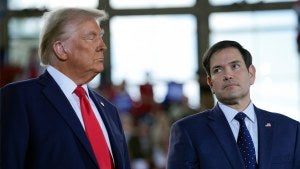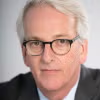Trump's Cabinet Picks Point to Significant Shifts in Global Policy
 Play Video
Play Video
About This Episode
This week, we analyze what Donald Trump’s early picks for key positions reveal about his approaches to foreign policy, national security, and international economic policy. We’ll explore who may benefit from his return to office—including potential gains for Russia, Israel, Gulf states, and the Global South—as well as those who may face setbacks, such as Ukraine and US allies in Europe and Asia. Will China suffer economic upheaval or take advantage of political opportunities? Finally, we’ll examine how Trump’s top issue of immigration and his promises of a closed border and mass deportations might undercut his other policy goals, especially related to the economy. Bobby Ghosh, Nahal Toosi, and Giles Whittell join Ivo Daalder for timely analysis of the strategic shifts that may be taking shape with Trump’s picks for top roles.
While we encourage you to watch or listen to the episode (and subscribe wherever you get your podcasts!), these are Ivo's top takeaways from today's discussion:
- This week, Donald Trump began to take charge of the U.S. government by announcing his appointments to senior positions – the secretaries of state and defense, the directors of the CIA and the intelligence community, the attorney general, and his top homeland security officials. Many of these shocked Washington and the world. Bobby quoted an aphorism, that “when a clown moves into a palace, he doesn't become a king. The palace becomes a circus.” What all appointments have in common is their expressed loyalty to the president rather than their actual experience for the positions they were chosen. And once their nominations move to the Senate, they will set up a true test case for the new Republican majority there — and for the checks and balance at the center of America’s constitutional democracy. For many of these picks — whether Tulsi Gabbard for DNI, Pete Hegseth for the Pentagon, or Matt Gaetz for Justice — are well beyond the range of normal cabinet choices. New Senate Majority Leader John Thune will have his hands full. Can he marshal the 50 votes he needs for each confirmation to satisfy Trump or will he allow the Senate to defy the President’s wishes? Bobby suggested that we watch closely the 20 Republican Senators up for reelection in two years.
- We next discussed how the world is reacting to Trump’s election and cabinet picks. There are some clear winners, Giles noted. Vladimir Putin is delighted; he has a sympathetic president in the Oval Office. He might even agree to a ceasefire to give Trump a win, enabling him to strengthen bonds with other countries and refuel for another round of fighting down the line. The Israeli government couldn’t be more pleased by the slew of appointments of people who strongly back their most extreme positions (eg, annexation of the West Bank) and a hardline towards Iran. Ukraine is a clear loser, likely facing the prospect of its major arms supplier conditioning aid on an agreement to end the fighting or facing a cutoff altogether. China may see more room for maneuver, especially in Europe and the Indo-Pacific if Trump pursue his skepticism towards alliances and raises tariffs on imports. India and other countries in the global south likely will see a more inward-looking America as strengthening their hands and influence. Even in many allied countries, political movements on the right will see Trump’s election as affirmation that their own anti-immigrant stance has political staying power.
- As for Trump’s promise to deport millions of immigrants, his early appointments of Tom Homan as “border czar” and Steve Miller as homeland security advisor suggest that his oft-repeated calls for deportating millions of immigrants will be implemented. Nahal argued that these policies were unlikely to be just performative (as building the wall turned out to be in the first term). Even if Trump isn’t serious, the people he’s put in place have learned from their mistakes and will pursue anti-immigration policies without fail from day one. Even so, these policies may pose problems for Trump’s other priorities. Removing large numbers of immigrants from the labor force will increase employment pressures and likely raise wage costs—and thus inflation. Mexico would have to cooperate on deporting large numbers of people, but Trump is at the same time threatening to impose massive tariffs on imports from the southern neighbor. And who will pay for the implementation of the policy—the detention camps and actual deportations themselves? Trump as president has a lot of power, but he will need the cooperation of Congress and others to implement these policies.
That’s it for Ivo's quick takes of this week’s episode. To get the full flavor, please watch or listen to the episode.
Prefer to Listen?







